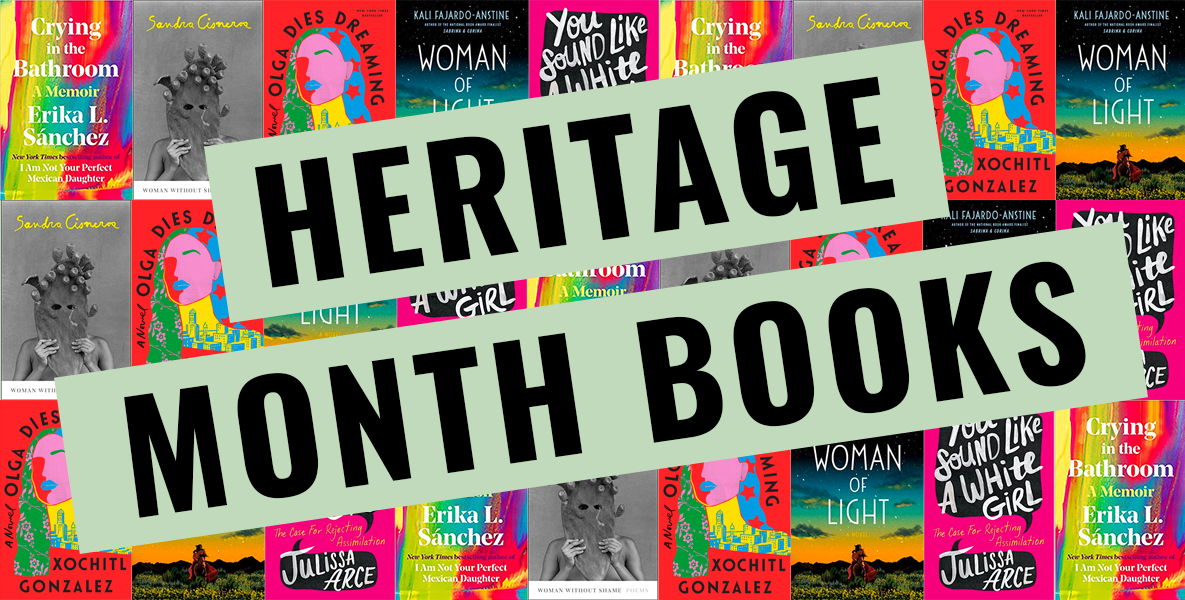We’ve all heard the phrase “representation matters,” and while plenty of ‘universal’ experiences may make a story relatable, there is truly something special about reading a book that reflects your own culture. Fortunately, we are living in a time when Latinx books are becoming more prevalent than ever before.
This year alone has brought us everything from memoirs, to poetry collections, to historical fiction – all by Latina authors. So, if you’re looking to read something this Latinx Heritage Month, whether it’s to help you reconnect with your roots or to add a few titles to an ever-growing TBR pile, these five books are a perfect place to start.
Crying in the Bathroom by Erika L. Sanchez
In her hilarious, beautiful, and poignant memoir, Erika L. Sanchez candidly writes about everything from her difficult relationship with her mother during her teen years, to terrible dates, to her mental health struggles.
Her ability to write so authentically about some of the most painful moments in her life is indicative of the shift taking place among many Millennial Latinas. We are contending with our families and culture by addressing topics that were once considered too taboo to discuss.
With this Crying in the Bathroom, Sanchez continues to demonstrate what a gift her work is to our culture and the literary world as a whole.
Olga Dies Dreaming by Xochitl Gonzalez
Hailed as “one of the best books of the year” by NPR, Goodreads, and more, Xochitl Gonzalez’s debut novel Olga Dies Dreaming details the life of Olga Acevedo, a wedding planner for the East Coast elite, as she navigates relationships, family drama, and staying true to herself.
This novel is a timely read that discusses activism, gentrification, LGTBQ+ issues, as well as the devastation in Puerto Rico after Hurricane Maria, which is particularly relevant, considering the current state of affairs after the destruction caused by Hurricane Fiona just last week.
Woman Without Shame by Sandra Cisneros
Although she made some controversial comments in support of the 2020 novel American Dirt, Sandra Cisneros remains a leading Latina author. And her first poetry collection in almost 30 years (prior collections include Loose Woman and My Wicked Wicked Ways) is highly anticipated, coming out just before the official start of Latinx Heritage Month.
In Woman Without Shame, Cisneros continues to break cultural conventions by writing about her sexual experiences, her changing body, and in an aptly titled poem, “Neither Señorita or Señora,” the decision to never marry or bear children.
Cisneros’ observations and carefully crafted images are written in the familiar prose we are accustomed to from her and it’s as lovely as ever.
Woman of Light by Kali Fajardo-Anstine
Kali Fajardo-Anstine’s novel spans across five generations of a Colorado family and ultimately centers on Luz Lopez, a tea reader and laundress as she navigates her life in 1930s Colorado after a series of tragedies.
Inspired by the stories of her own family, Fajardo-Anstine has stated that she wrote Woman of Light because she, “wanted other Chicano and Indigenous people, people coming from multicultural backgrounds to have an understanding of who they are.”
Those familiar with Fajardo-Anstine’s Sabrina and Corina, a collection of short stories that went on to become a National Book Award finalist, can expect to find similar themes of family estrangement, violence, and resilience.
You Sound Like a White Girl by Julissa Arce
I’ve written about this book before, and if you ask me, I think it should be required school reading whether it’s Latinx Heritage Month or not Julissa Arce masterfully weaves her personal experiences as a formerly undocumented person contending with what it means to be an American along with a thoroughly researched history of Mexican Americans in the US to create an eye-opening read.
In You Sound Like a White Girl, Arce addresses the pillars of acceptance in America (speaking English, making money, being white, being a citizen) and how even when people from minority groups achieve these things (she explains the legality of how Mexicans became “white”), they continued to be othered and aren’t considered “real Americans.”
You Sound Like a White Girl is filled with heartbreaking truths, but also the reassurance that claiming and finding pride in our own cultural identity is how we find the justice that many desire.

